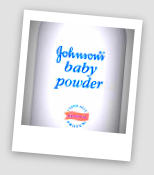Recently a wrongful death lawsuit was filed against Johnson & Johnson, claiming that many cases of ovarian cancer from talcum powder could have been prevented if the company had placed warning labels on Johnson’s Baby Powder and Shower-to-Shower about the risk of using the talc powder around the genitals.

Florence Kuntz filed in the U.S. District Court for the Northern District of Texas, alleging that the routine use of talcum powder for feminine hygiene for many years caused the death of her daughter.
The daughter was 43 years old when she was diagnosed with ovarian cancer, after using Johnson & Johnson talcum powder for 23 years.
Kuntz alleges that Johnson & Johnson knew about the ovarian cancer risk but didn’t warn consumers. According to Kuntz’ claims, “In 1982, the first epidemiologic study was performed on talc powder use in the female genital area. This study was conducted by Dr. Daniel Cramer and others. This study found a 92% increased risk in ovarian cancer with women who reported genital talc use. Shortly after this study was published, Dr. Bruce Semple of Johnson & Johnson came and visited Dr. Cramer about his study. Dr. Cramer advised Dr. Semple that Johnson & Johnson should place a warning on its talcum powders about the ovarian cancer risks so that women can make an informed decision about their health.”
Kuntz alleges that medical data shows that the ovarian cancer risk from talc powder dates back to at least 1971.
Talcum Powder Ovarian Cancer Links
Johnson & Johnson has touted their talc based products for decades as a general body powder for adult women, particularly black and hispanic women. The advertising pitched to these women encouraged them to use talcum powder after every shower and place it in their underwear to maintain “personal freshness.”
Several medical studies have found that talcum powder can increase the risk of ovarian cancer when applied to a woman’s genitals. One study even microscopic particles of talc in ovarian tumors.
Talc Ovarian Cancer Trials
To date, two talcum powder lawsuits out of several thousand filed against Johnson & Johnson have gone to trial. In these two trials, the jury awarded multi-million dollar damages, finding that Johnson & Johnson failed to adequately warn about the ovarian cancer risk.
The majority of cases have been filed in St. Louis, Missouri, in February, a jury awarded $72 million in damages to the family of a woman who died from ovarian cancer, and another jury awarded $55 million in another talc ovarian cancer lawsuit in May, to a woman who developed ovarian cancer following decades of using the blockbuster consumer products.
During the trials, company documents revealed that Johnson & Johnson was aware of the potential link between talcum powder and ovarian cancer since the 1970s. In 1992, the documents showed that Johnson & Johnson specifically targeted sales towards women who were high users of talcum powder, without warning them of the possible cancer risks.





